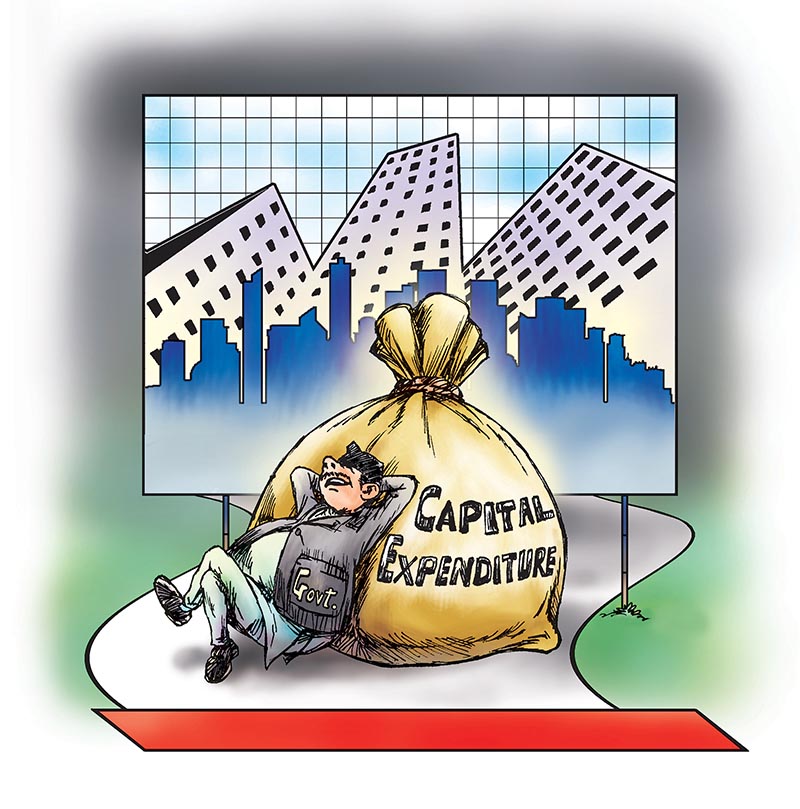‘Elections unlikely to affect capital expenditure’
The mobilisation of decision-making staffers for the elections will certainly hamper development activities thus affecting spending capacity
Kathmandu, November 2
With the announcement of dates of provincial and parliamentary elections, concerns have been raised about development works taking a hit due to the involvement of bureaucrats and contractors in the election process. However, experts have said that the government’s expenditure will not be affected because of the elections if the officials are serious about their work.
“The elections should not have any effect on the spending process,” said Shanta Raj Subedi, the former finance secretary. “However, it is a set trend that in the name of elections, government officials and contractors always try to shy away from their responsibilities.”
Subedi said that there will be no such obstruction because of the elections to implement the plans and programmes that have already been decided upon. “The government cannot allocate budget for new plans and programmes, however elections never affect the implementation of programmes that have already been set,” he added.
Subedi also stated that the elections would actually help accelerate economic activities, which could boost revenue sources of the government.
Economist Dilli Raj Khanal also expressed the same view. “There are many programmes that are yet to be contracted. If the concerned officials are serious about their duties, they can finalise the paper works during the election period as the entire bureaucracy will not be mobilised in the election process,” he said.
He also stated that if the government finalises the preparatory works to implement the projects before the election, the new government that will be formed after the election will be able to realise them.
“Even if there are hurdles in implementing the projects because of the elections, the next government would be able to compensate for it if the officials finalise the pre-implementation activities,” Khanal said.
In the past too, the elections have not had any significant effect on the government’s capital expenditure.
The government had conducted two Constituent Assembly elections in 2008-09 and 2014-15. Yet, the government had spent Rs 53.51 billion in fiscal 2008-09, which was Rs 13.78 billion more than in the previous fiscal.
Similarly, in fiscal year 2014-15, when the second Constituent Assembly election was held, the government had spent Rs 66.69 billion under development budget, which was Rs 12.20 billion more when compared to the previous year.
Moreover, the past trend reveals the government’s capital expenditure had increased in the year after the election. The government had spent Rs 73.10 billion in fiscal 2009-10, which was Rs 19.59 billion more than the expenditure of fiscal 2008-09. In fiscal 2015-16 too, the government’s expenditure increased to Rs 88.84 billion from Rs 66.69 billion of fiscal 2014-15.
Though experts have expressed views that the elections should not have any huge impact on capital expenditure, government officials have said that due to the involvement of contractors and government officials in the election process, the development process could be directly affected, which in turn may hit the government’s target to spend the capital budget.
“The government will have to mobilise officials for the election process, which will directly affect the spending capacity. The mobilisation of decision-making staffers for the elections will certainly hamper development activities,” a high-level source at the Ministry of Finance said.
Finance Secretary Shankar Prasad Adhikari also said big political movements like elections do affect the development process, however it should be taken as normal in a democratic set-up.
“We all know that the entire state mechanism will be mobilised for the elections. Due to this, development expenditure could be affected, however it will take its normal course after the elections,” Adhikari stated.
The government has announced current fiscal as ‘Budget Implementation Year’. Despite a good environment to spend the budget, the government has been unable to spend the allocated budget in the current fiscal year.
Ministries themselves have set a target to spend 29 per cent of the total allocated capital expenditure worth Rs 335.18 billion in the first quadrimester while submitting plans and programmes in the Line Ministry Budgetary Information System. However, according to data maintained by the Financial Comptroller General Office, only 5.19 per cent or Rs 17.38 billion has been spent in capital expenditure till date.
The provincial and parliamentary elections are slated to be held on November 26 and December 7.






